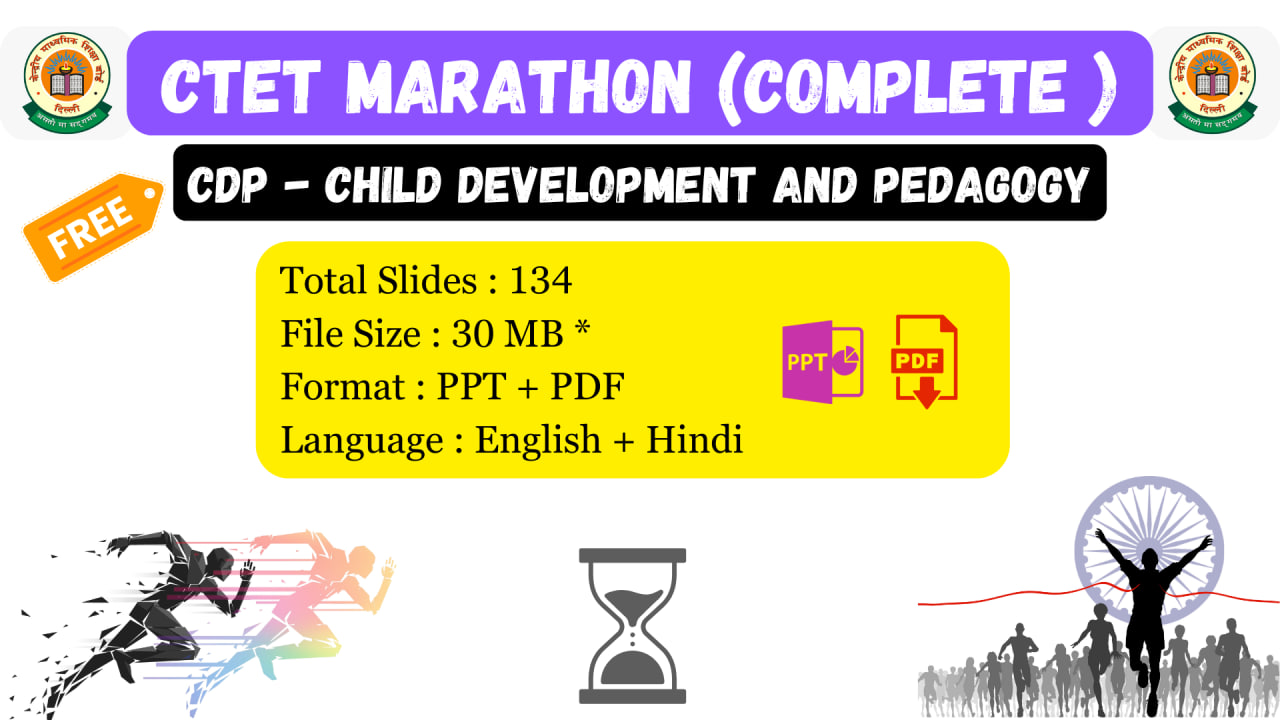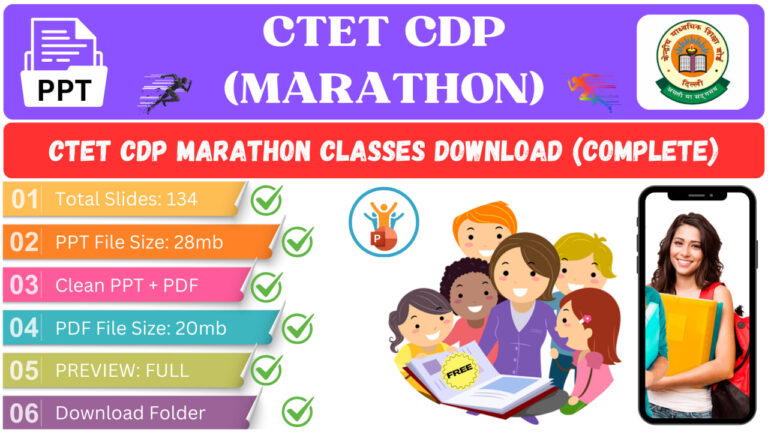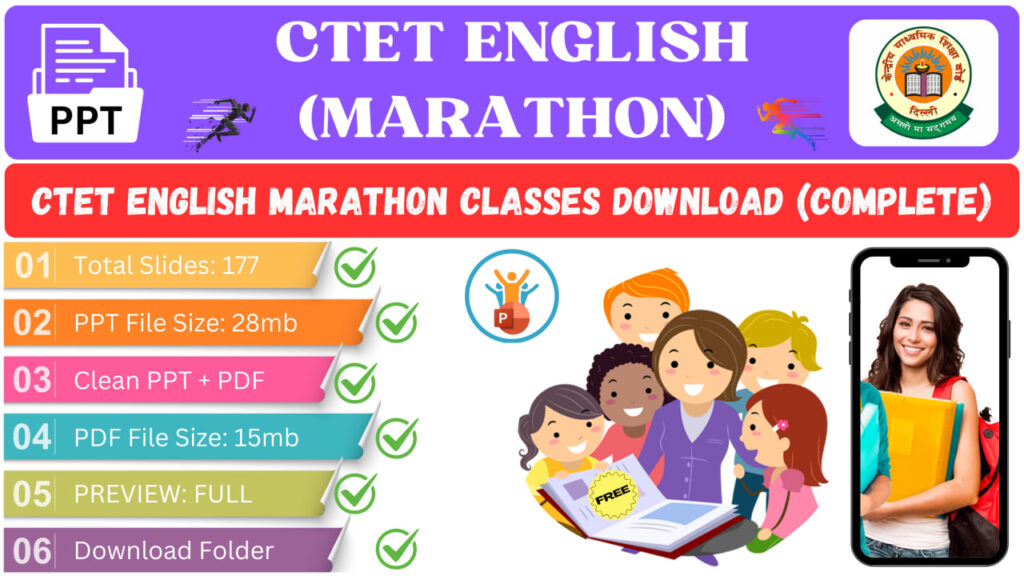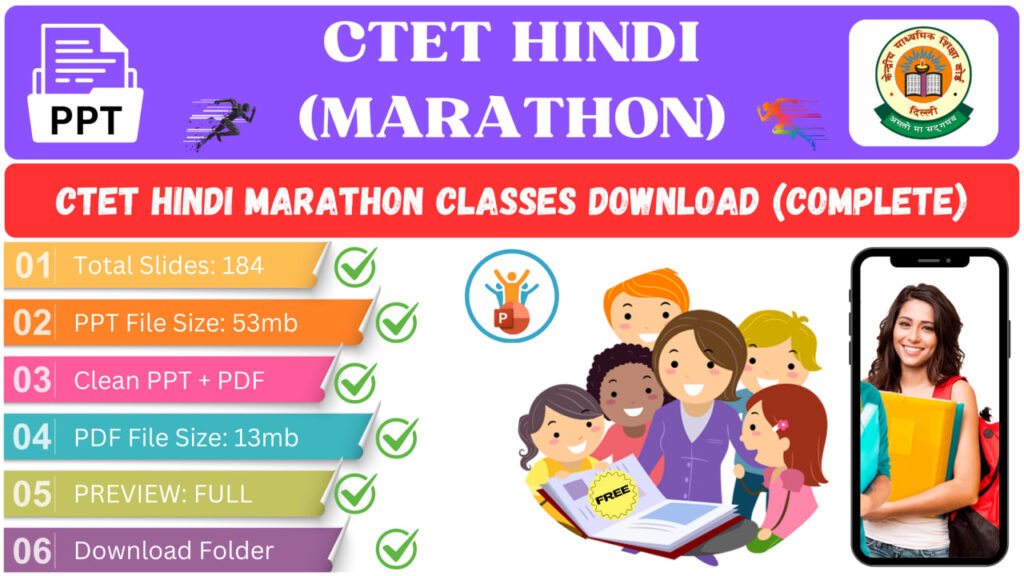CTET CDP Marathon Classes PPT Download
(Complete Slides)
Today we are providing self -made CTET notes, PDF and PPT slides for you, which are available for CTET CDP Marathon Classes PPT Download (COMPLETE). The Central Teacher Eligibility Test (CTET) is a national-level examination conducted by the Central Board of Secondary Education (CBSE) in India. It is mandatory for candidates aspiring to become teachers in primary (Classes 1-5) and upper primary (Classes 6-8) schools. Child Development and Pedagogy (CDP) is a crucial section in both Paper I and Paper II of the CTET exam. This section evaluates your understanding of child psychology, teaching-learning processes, and educational practices. This article provides a comprehensive guide to the CTET CDP syllabus, important topics, preparation strategies, and study notes to help you excel in the exam.
Table of Contents
CTET CDP Marathon Classes
(PPT SLIDES)
Important Notes:
- If you are viewing this PPT on your phone, switch to full-screen mode for the best experience. (Tap the 3 dots in the PPT and select “Full Screen.”)
- If you encounter issues while navigating, simply tap on the slide instead of using the “Next” button.
- For an enhanced viewing experience on a PC or laptop, press Ctrl + Shift + F.
Pricing Page (SlidesharePPT.net)
CTET Marathon Notes (PPT + PDF) Bundle
(BUY ONLINE)
| Placement / Section | Details / Click To Action Text |
|---|---|
| Title | CTET PPT & PDF Notes (BUNDLE) |
| Number of PPTs / Slides | 10 PPTs + 10 PDFs |
| Delivery Method | Instant Access after Payment (Google Drive Folder) |
| Additional Info | Full Marathon Syllabus Coverage, Study-Friendly PPT Format |
| Copyright / Ownership | Self-made Notes (slideshareppt.net) |
| Payment | Online Gateway – QR, CREDIT CARD, UPI etc… |
| Pricing / Purchase CTA | Check Price & Buy (Redirects to Pricing Page) |
| Demo Link | View Sample Slides (Click to Open Demo) |

(CTET CDP Self Study Topics)
The CDP section is divided into the following key areas:
- Child Development (Primary School Child)
- Concept of Inclusive Education and Understanding Children with Special Needs
- Learning and Pedagogy
1. Child Development (Primary School Child)
This section focuses on the development of children during their primary school years. Key topics include:
- Concept of Development and Its Relationship with Learning:
- Principles of development (e.g., continuity, individual differences)
- Influence of heredity and environment on development
- Piaget’s Theory of Cognitive Development:
- Stages: Sensorimotor, Preoperational, Concrete Operational, Formal Operational
- Kohlberg’s Theory of Moral Development:
- Stages: Pre-conventional, Conventional, Post-conventional
- Vygotsky’s Theory of Social Constructivism:
- Zone of Proximal Development (ZPD)
- Scaffolding
- Child-Centered and Progressive Education:
- Role of the teacher in facilitating learning
- Individual Differences:
- Understanding diverse learners (e.g., gifted, slow learners)
2. Concept of Inclusive Education and Understanding Children with Special Needs
This section emphasizes the importance of inclusive education and catering to children with special needs. Key topics include:
- Inclusive Education:
- Concept and significance
- Addressing the needs of diverse learners
- Children with Special Needs (CWSN):
- Types of disabilities (e.g., learning disabilities, physical disabilities)
- Strategies for teaching CWSN
- Role of Teachers in Inclusive Education:
- Creating an inclusive classroom environment
- Collaboration with parents and specialists
3. Learning and Pedagogy
This section evaluates your understanding of teaching-learning processes and pedagogical practices. Key topics include:
- Concept of Learning:
- Theories of learning (e.g., behaviorism, constructivism)
- Factors influencing learning (e.g., motivation, environment)
- How Children Think and Learn:
- Role of curiosity and exploration
- Social context of learning
- Motivation and Learning:
- Intrinsic vs. extrinsic motivation
- Strategies to motivate students
- Teaching-Learning Process:
- Principles of effective teaching
- Role of the teacher as a facilitator
- Assessment and Evaluation:
- Continuous and Comprehensive Evaluation (CCE)
- Formative and summative assessments
Also Read: UPSC PPT SLIDES (COMPLETE SERIES)
Important Topics for CTET CDP
Here are some key topics to focus on for the CTET CDP exam:
- Piaget’s Theory of Cognitive Development:
- Example: A child in the preoperational stage (2-7 years) is egocentric and cannot understand others’ perspectives.
- Kohlberg’s Theory of Moral Development:
- Example: A child at the pre-conventional stage obeys rules to avoid punishment.
- Vygotsky’s Theory of Social Constructivism:
- Example: A teacher provides scaffolding to help a student solve a math problem.
- Inclusive Education:
- Example: Using audio-visual aids to teach children with hearing impairments.
- Motivation and Learning:
- Example: Praising a student for their effort to boost intrinsic motivation.
- Assessment and Evaluation:
- Example: Using quizzes and projects for formative assessment.
Preparation Tips for CTET CDP
- Understand the Syllabus: Break down the syllabus into smaller sections and create a study plan.
- Focus on Theories: Revise key theories of development and learning (e.g., Piaget, Vygotsky, Kohlberg).
- Practice MCQs: Solve multiple-choice questions (MCQs) to test your understanding of concepts.
- Refer to NCERT Books: NCERT textbooks on education and psychology are excellent resources for CDP preparation.
- Take Notes: Make concise notes for quick revision.
- Solve Previous Year Papers: Practice past CTET question papers to understand the exam pattern.
- Take Mock Tests: Attempt mock tests to improve time management and accuracy.
CTET CDP Study Notes
Here are some concise notes to help you prepare:
- Piaget’s Theory of Cognitive Development:
- Sensorimotor Stage (0-2 years): Learns through senses and actions.
- Preoperational Stage (2-7 years): Develops language and imagination.
- Concrete Operational Stage (7-11 years): Thinks logically about concrete events.
- Formal Operational Stage (11+ years): Thinks abstractly and hypothetically.
- Kohlberg’s Theory of Moral Development:
- Pre-conventional Level: Obeys rules to avoid punishment.
- Conventional Level: Follows rules to gain approval.
- Post-conventional Level: Understands universal ethical principles.
- Vygotsky’s Theory of Social Constructivism:
- Zone of Proximal Development (ZPD): Difference between what a child can do independently and with guidance.
- Scaffolding: Temporary support provided by a teacher to help a child learn.
- Inclusive Education:
- Ensures equal opportunities for all learners.
- Adapts teaching methods to meet diverse needs.
- Motivation and Learning:
- Intrinsic Motivation: Driven by internal rewards (e.g., curiosity).
- Extrinsic Motivation: Driven by external rewards (e.g., grades).
- Assessment and Evaluation:
- Formative Assessment: Ongoing evaluation (e.g., quizzes, projects).
- Summative Assessment: End-term evaluation (e.g., exams).
Also Read: CTET SANSKRIT Marathon Classes PPT Download (COMPLETE)
Conclusion
CTET Child Development and Pedagogy (CDP) is a vital section that tests your understanding of child psychology, teaching-learning processes, and inclusive education. By understanding the syllabus, focusing on key topics, and practicing regularly, you can excel in this section. Use NCERT books, solve previous year papers, and take mock tests to boost your confidence. With the right preparation, you can crack the CTET CDP section and move closer to achieving your dream of becoming a teacher.


